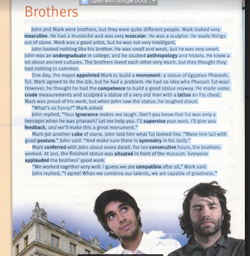Mar 28, 2022
M3
Brothers
John and Mark were brothers, but they were quite different people. Mark looked very
masculine. He had a mustache and was very muscular. He was a sculptor. He made things
out of stone. Mark was a good artist, but he was not very intelligent.
John looked nothing like his brother. He was small and weak, but he was very smart.
John was an undergraduate in college, and he studied anthropology and history. He knew a
lot about ancient cultures. The brothers loved each other very much, but they thought they
had nothing in common.
One day, the mayor appointed Mark to build a monument: a statue of Egyptian Pharaoh,
Tut. Mark agreed to do the job, but he had a problem. He had no idea who Pharaoh Tut was!
However, he thought he had the competence to build a good statue anyway. He made some
crude measurements and sculpted a statue of a very old man with a tattoo on his chest.
Mark was proud of his work, but when John saw the statue, he laughed aloud.
“What’s so funny?” Mark asked.
John replied, “Your ignorance makes me laugh. Don’t you know that Tut was only a
teenager when he was pharaoh? Let me help you. I’ll supervise your work. I’ll give you
feedback, and we’ll make this a great monument.”
Mark got another cube of stone. John told him what Tut looked like. “Make him tall with
good posture,” John said. “And make sure there is symmetry in his body.”
Mark conferred with John about every detail. For ten consecutive hours, the brothers
worked. At last, the finished statue was situated in front of the museum. Everyone
applauded the brothers’ good work.
“We worked together very well. I guess we are compatible after all,” Mark said.
John replied, “I agree! When we combine our talents, we are capable of greatness.”

anthropology [a3narapalad3i] n.
Anthropology is the study of people, society, and culture.
—*■ In anthropology class, I learned about simple tools that ancient cultures used.
applaud [opI6:d] v.
To applaud means to clap in order to show approval.
—► Everyone cheered and applauded Manny’s efforts.
appoint [apoint] V.
To appoint someone to a job means to give the job to them.
—► Two students were appointed to help the scientists with their research.
compatible [kampsetabal] adj.
When things are compatible, they work well or exist together successfully.
—»Jan and Fred are too different. They will never be compatible.
competence [kampatans] n.
Competence is the ability to do something well or effectively.
-* The job was easy because the group had enough competence to do it well.
confer [kanfar] v.
To confer with someone means to discuss something with them to make a decision.
—* I will have to confer with my wife before I can purchase a new car.
c o n s e c u t i v e [kansekjativ] adj.
When things are consecutive, they happen one after another without interruption.
—* The king ruled for ten consecutive years.
crude [kru:d] adj.
When something is crude, it is not exact or detailed, but it can still be useful.
—► She drew crude hearts on the ground to show how much she loved him.
CUbe [kju:b] n.
A cube is a solid object with six square surfaces that are all the same size.
-* Please get me some ice cubes to put in my soda.
feedback [ff:dba=>k] n.
Feedback is comments to a person about how they are doing something.
—► I asked my boss for feedback on my work.
ignorance [ignarsns] n.
Ignorance of something is lack of knowledge about it.
—► When he failed the test, his ignorance of math was obvious.
masculine [mseskjalin] adj.
When something is masculine, it is a quality or thing related to men.
—»American football is usually considered a masculine sport.
monument [mdnjamant] n.
A monument is a structure that is built to remind people of a person or event.
-» A large monument was built to honor the brave soldiers.
muscular [mAskjalar] adj.
When someone is muscular, they are very fit and strong.
—► He exercised regularly so that his body could become muscular.
posture [pastjar] n.
A person’s posture is the position in which they stand or sit.
-* Your back will feel better if you improve your posture.
situate [sitfueit] v.
To situate something means to place or build it in a certain place.
—► The road was situated between the forest and the lake.
supervise [su:parvaiz] v.
To supervise something means to make sure that it is done correctly.
-* Allen supervised the construction workers to ensure everyone’s safety.
symmetry [simatri] n.
Symmetry is the state of having two halves that are exactly the same.
—► The artist made sure to use perfect symmetry when painting the butterfly.
tattOO [taetu:] n.
A tattoo is a design that is drawn permanently on the skin with needles.
—► The surfer had tattoos on both his arms.
undergraduate [Andargraed3 uit] n.
An undergraduate is a student at a college who is studying fora bachelor’s degree.
—»She was excited to finish high school and enroll as an undergraduate in the fall.
By undefined
3 notes ・ 14 views
Filipino
Beginner